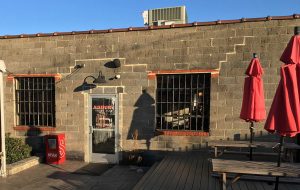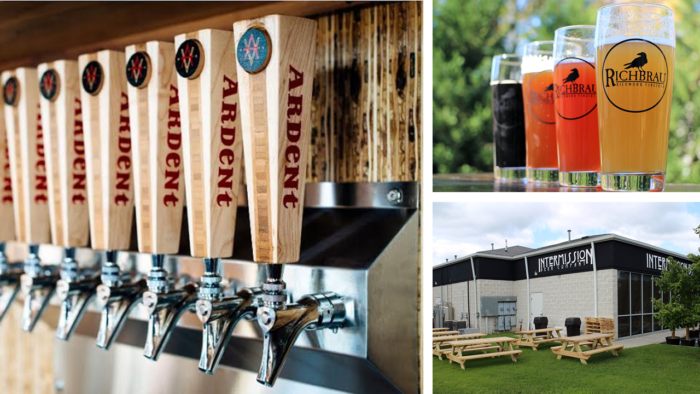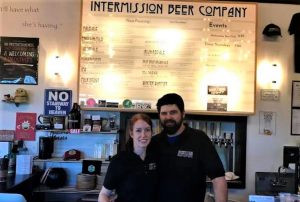It’s not often a business owner is thankful for a 25 percent reduction in revenue. But that’s the way Matthew Mullett, co-owner of Richbrau Brewing in Shockoe Bottom, felt in the early spring.
Following the state’s stay-at-home order in mid-March, Mullett said Richbrau was anticipating a nearly 50 percent drop in revenue. But the brewery’s losses were about half of that, thanks to demand for to-go and delivery orders.
“(Delivery and takeout) blew away our expectations. … We saw people coming out in droves,” Mullett said.
“We’re fortunate to have a roll-up door right on the sidewalk so people can buy beer right there. Maybe there’s an element of impulse buys. We had people who might’ve never walked in the door peeking their heads in.”
With Virginia’s reopening gradually moving forward, some local brewery owners are reflecting on the hectic last few months, considering how to bring back tasting room sales, and acknowledging that the industry is not yet out of the woods.
Richbrau was one of dozens of local breweries that pivoted to takeout and delivery to help quarantined Richmonders get a drink with restaurants and taprooms closed. Mullett wasn’t the only one to be pleasantly surprised by how well the to-go concept worked.
“The curbside and delivery business has been surprisingly good,” said Tom Sullivan, co-owner of Ardent Craft Ales in Scott’s Addition. “It’s not a long-term solution at all, but it’s breathing some life back into our business after the complete disintegration of on-premise sales.”

Tom Sullivan (left) of Ardent Craft Ales pivoted to delivery in March. (BizSense file courtesy Ardent Craft Ales)
‘Cans were like gold’
The downside to the reliance on off-premise sales is it turned empty cans into a hot commodity, something many in the brewing industry feared.
Courtney and Justin White, owners of Intermission Beer Co. in Henrico, said they got in an order of cans in mid-March that made a huge difference for them.
“That definitely saved us. Not just in Richmond, but everywhere across the U.S., cans were like gold and nobody was able to supply them,” Courtney said.
“And crowlers were just M.I.A,” Justin added, referring to the large cans that are filled to order.
At Richbrau, Mullett said they’d ordered about 160 cases of empty cans and burned right through them.
“We went through about six months’ worth of (can) inventory in like 35 days,” he said. “Had I had a crystal ball I would’ve ordered like 300 cases instead of 160.”
With cans hard to find, Intermission started what Courtney called a growler exchange: Bringing in and cleaning people’s growlers and swapping them for one full of Intermission’s beer.
“We took in random people’s growlers and gave them one that had already been through the (sanitation) process. That was one way we were able to adapt, rather than buy brand new growlers that people had to then in turn buy,” White said.
Takeout, delivery here to stay
Even with on-premise sales on their way back, some brewers are betting on the takeout and delivery avenues to play a bigger role in their business plans going forward. Mullett said they made a sizable investment in their own canning line in anticipation of that.
“The reason we did so well in packaging was because people were off work or working at home and could have a beer while they’re working. People had a lot of downtime and some self-medication probably took place,” Mullett said.
“As everybody gets back to work, there won’t be the time or demand to keep (packaging sales) where they were when lockdowns first started happening. As things go back to normal, I think our product mix will shift from pre-COVID, which was 90 percent draught and 10 percent packaged. It might end up falling out at 80-20.”
Sullivan said he thinks that delivery demand will remain to some degree.
“Maybe Richmond decides that (delivery is) something that was missing from their lives and now they can’t live without it. That would be great,” Sullivan said.
“Having delivered some of these orders myself, I think people really love it. You know, sitting on your porch and having someone drive up and hand you beer is a pretty great thing on a Friday.”
Like many local businesses in the hospitality industry, local brewers are taking a cautious approach to reopening their tasting rooms to customers who want to come sit and drink. Ardent, Intermission, Richbrau and many other local breweries waited a few weeks before opening their patios for limited seating.

Ardent and other local breweries waited a few weeks before opening their patios for limited seating. (BizSense file by J. Elias O’Neal)
The potential return of on-premise sales remains to be seen. Sullivan at Ardent said he thinks as long as people feel there’s a danger brought on by the virus, they’ll be less prone to return.
“In hospitality, our job is selling little bits of comfort and joy to people. You can’t create an environment where you’re giving that service to people when there’s this danger still,” he said.
“We want the (government) policies to drive a return to safety. If there’s no safety, there’s no customer, which means there’s no industry.”
It’s not often a business owner is thankful for a 25 percent reduction in revenue. But that’s the way Matthew Mullett, co-owner of Richbrau Brewing in Shockoe Bottom, felt in the early spring.
Following the state’s stay-at-home order in mid-March, Mullett said Richbrau was anticipating a nearly 50 percent drop in revenue. But the brewery’s losses were about half of that, thanks to demand for to-go and delivery orders.
“(Delivery and takeout) blew away our expectations. … We saw people coming out in droves,” Mullett said.
“We’re fortunate to have a roll-up door right on the sidewalk so people can buy beer right there. Maybe there’s an element of impulse buys. We had people who might’ve never walked in the door peeking their heads in.”
With Virginia’s reopening gradually moving forward, some local brewery owners are reflecting on the hectic last few months, considering how to bring back tasting room sales, and acknowledging that the industry is not yet out of the woods.
Richbrau was one of dozens of local breweries that pivoted to takeout and delivery to help quarantined Richmonders get a drink with restaurants and taprooms closed. Mullett wasn’t the only one to be pleasantly surprised by how well the to-go concept worked.
“The curbside and delivery business has been surprisingly good,” said Tom Sullivan, co-owner of Ardent Craft Ales in Scott’s Addition. “It’s not a long-term solution at all, but it’s breathing some life back into our business after the complete disintegration of on-premise sales.”

Tom Sullivan (left) of Ardent Craft Ales pivoted to delivery in March. (BizSense file courtesy Ardent Craft Ales)
‘Cans were like gold’
The downside to the reliance on off-premise sales is it turned empty cans into a hot commodity, something many in the brewing industry feared.
Courtney and Justin White, owners of Intermission Beer Co. in Henrico, said they got in an order of cans in mid-March that made a huge difference for them.
“That definitely saved us. Not just in Richmond, but everywhere across the U.S., cans were like gold and nobody was able to supply them,” Courtney said.
“And crowlers were just M.I.A,” Justin added, referring to the large cans that are filled to order.
At Richbrau, Mullett said they’d ordered about 160 cases of empty cans and burned right through them.
“We went through about six months’ worth of (can) inventory in like 35 days,” he said. “Had I had a crystal ball I would’ve ordered like 300 cases instead of 160.”
With cans hard to find, Intermission started what Courtney called a growler exchange: Bringing in and cleaning people’s growlers and swapping them for one full of Intermission’s beer.
“We took in random people’s growlers and gave them one that had already been through the (sanitation) process. That was one way we were able to adapt, rather than buy brand new growlers that people had to then in turn buy,” White said.
Takeout, delivery here to stay
Even with on-premise sales on their way back, some brewers are betting on the takeout and delivery avenues to play a bigger role in their business plans going forward. Mullett said they made a sizable investment in their own canning line in anticipation of that.
“The reason we did so well in packaging was because people were off work or working at home and could have a beer while they’re working. People had a lot of downtime and some self-medication probably took place,” Mullett said.
“As everybody gets back to work, there won’t be the time or demand to keep (packaging sales) where they were when lockdowns first started happening. As things go back to normal, I think our product mix will shift from pre-COVID, which was 90 percent draught and 10 percent packaged. It might end up falling out at 80-20.”
Sullivan said he thinks that delivery demand will remain to some degree.
“Maybe Richmond decides that (delivery is) something that was missing from their lives and now they can’t live without it. That would be great,” Sullivan said.
“Having delivered some of these orders myself, I think people really love it. You know, sitting on your porch and having someone drive up and hand you beer is a pretty great thing on a Friday.”
Like many local businesses in the hospitality industry, local brewers are taking a cautious approach to reopening their tasting rooms to customers who want to come sit and drink. Ardent, Intermission, Richbrau and many other local breweries waited a few weeks before opening their patios for limited seating.

Ardent and other local breweries waited a few weeks before opening their patios for limited seating. (BizSense file by J. Elias O’Neal)
The potential return of on-premise sales remains to be seen. Sullivan at Ardent said he thinks as long as people feel there’s a danger brought on by the virus, they’ll be less prone to return.
“In hospitality, our job is selling little bits of comfort and joy to people. You can’t create an environment where you’re giving that service to people when there’s this danger still,” he said.
“We want the (government) policies to drive a return to safety. If there’s no safety, there’s no customer, which means there’s no industry.”





